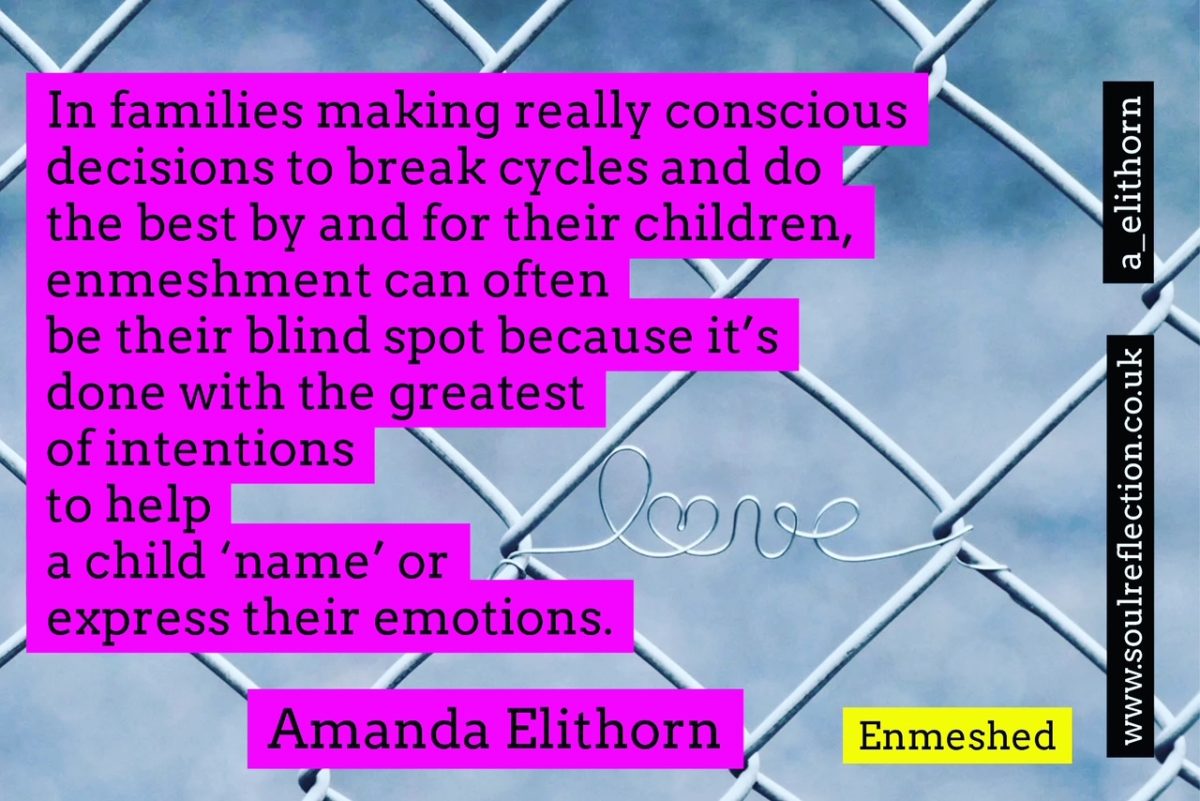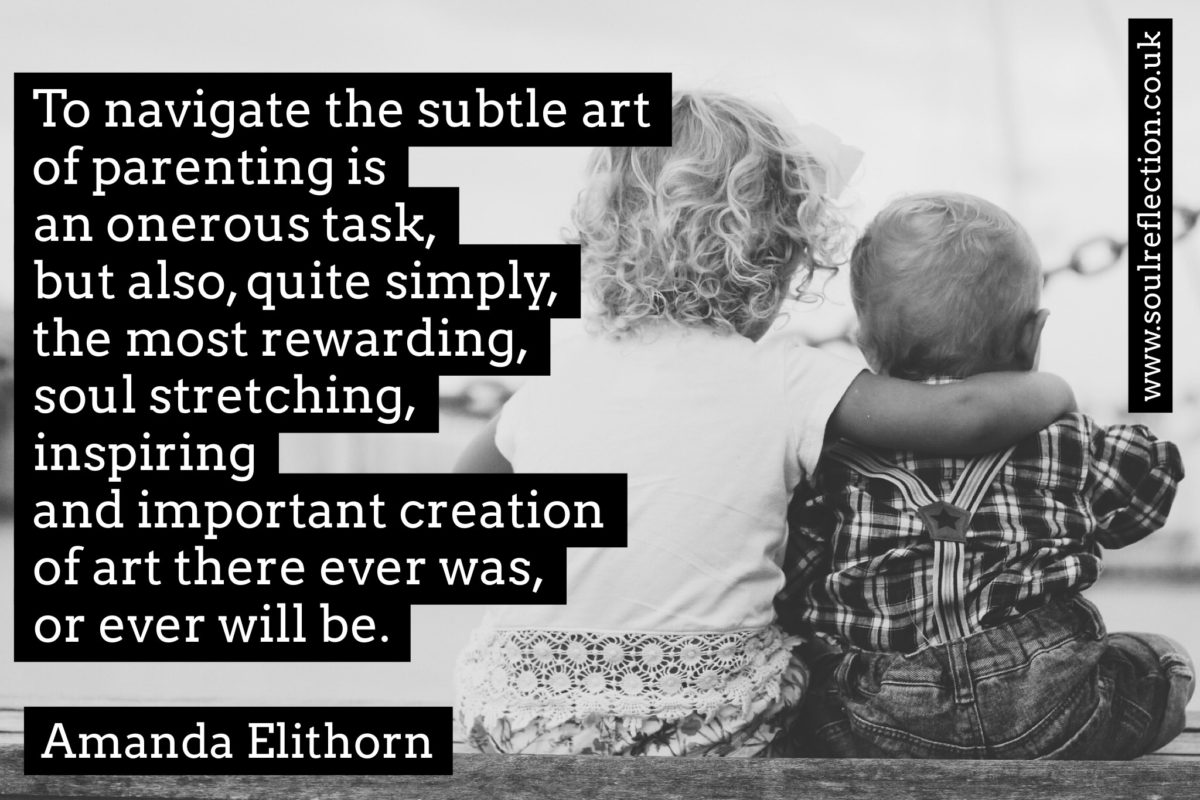I think that there is, in general, a natural level of enmeshment in any form of psychodynamic relationship, be that parent/child, romantic partner, even close friendship. Whilst there can also be psychodynamics between boss and employee, doctor and patient etc there is less likely to be true enmeshment in these more emotionally separate containers. A Venn diagram comes to mind… the cross overs creating areas of enmeshment where our feelings interact so deeply with each other and are so engaged with responding to each other that it can be hard to separate what is best for the individual at times.
Most recently I’ve been observing enmeshment between parent and child and when this starts to impinge on not just the mental health of the child but also how it impacts the fields of relationships surrounding them.
Both my children tip the balance into enmeshment when I am very sad about something, ironically because I don’t cry very much, when I do it can be overinflated by them into distress for themselves. There is a natural, biological cause for this, as their primary survival post, my unravelling could literally be theirs; so empathy becomes enmeshment when their own feelings are directed by mine. My job is to reassure them through my sadness and show them that my own strength is enough to carry me through rough moments without them feeling like they have to somehow fix it for me.
This example shows the thin veil between our children being beautifully empathetic and potentially unhealthily enmeshed, also highlighting why low level enmeshment is really a natural state between those we have strong psychological attachment to. However, I also see how some of the messaging in the conscious parenting movement can often foster disturbing and unhealthy enmeshment based on the beautiful principles of staying connected with our children’s emotions.
This simple study shows it quite clearly:
(Roles: parent, child, unrelated adult)
Parent warns unrelated adult who is collecting child that child might be disappointed by news of a cancelled event.
Adult collects child, informs child of cancelled event, pragmatically and simply. Child behaves acceptingly and continues in healthy dynamics with other children
Child returned to parent, parent immediately informs child ‘you must be disappointed by the cancellation’
On being told ‘they must be’ disappointed, child reacts as such and moves into a habitual behaviour that signifies their disappointment, including an age inappropriate tantrum and minor violence.
Parent accepts this as normal expression of disappointment and boundaries around their behaviour are loose. Here is a self perpetuating cycle that hinders both parent and child and their mutual relationship. Parent’s too intense concern over disappointment feeds the child, who then ‘proves’ to the parent how desperate their disappointment is. Setting them both up perfectly for the next event that may be disappointing.
Instead if the child were reassured that disappointment is a fact of life and had that feeling simply, briefly and kindly acknowledged, the child would learn great life skills and resilience. Helping them to see that the tantrum and violence were disproportionate to the event equally helps them to learn to measure and scale their emotions appropriately.
As it was the parent felt overwhelmed and struggled with the deep enmeshment of anxiety around their own and the child’s potential feelings, their own history of disappointment (most likely from a childhood wounding) whilst simultaneously experiencing the painfully conflicting discomfort the antisocial behaviour provoked. Other children witnessing were shocked and felt the need to distance themselves from the child, causing social and friendship issues later down the line.
I see examples like this every single day in a school environment; most are transitory, the parent will quickly learn and adjust, whilst a few will deepen into these subconscious ruts within the neurology of both parent and child and go on to create pathological behavioural issues.
The most poignant part for me is that, whilst these upsetting dynamics can be expected within families that are playing out ancient wounds with no awareness or impetus to do it differently, in families making really conscious decisions to break cycles and do the best by and for their children, this enmeshment can often be their blind spot because it’s done with the greatest of intentions to help a child ‘name’ or express their emotions. Under the guise of help and protection, yet ultimately causing harm.
So perhaps conscious parenting needs to be focused more on the consciousness of the parental wounds and how they impact the child rather than over compensating for those scarred parts of us.
As an addendum, I don’t usually write pieces that are focused on another person’s actions or behaviour because it can appear so judgemental and also rarely traces the full picture of events that are always deeply nuanced with the contexts of each person’s soul journey. I make the exception here because I found this particular study so eye opening for myself that it really helped me to look within and explore my own enmeshments across many relationships not least with my children. So I share it here not to shame any parent for doing their best, with all their love and intention, but as the offering it was to me, to look within and raise my consciousness to be more aware of when my wounds prevent another’s own expression and well being.
First published on social media on 30th May 2023


